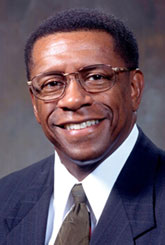When I was a boy of 8 or 9, my parents drove us to Selma, Ala., to pick up some supplies for our family farm, which was located in the nearby town of Marion. We walked by a drugstore with an ice cream counter. I ran inside and sat up on the stool and asked the man behind the counter for an ice cream cone. He just stood there looking at me, and then my mother snatched me up and yanked me out of there. I didn’t understand why I couldn’t get an ice cream cone.
When we were driving home, my mother told me I shouldn’t do that anymore, but I don’t know that she ever told me the reason why. As we grew up, our folks taught us what to do if we found ourselves in certain situations, but they didn’t teach us to be hateful. My parents did not preach hatred. They loved the Lord and taught us to love our country. They loved and honored the flag of the United States of America. Five of the eight young men in our family proudly served in the U.S. military.
On that day some 60 years ago when the man in the drugstore refused to serve me an ice cream cone, there was no Confederate flag draped over the counter. Nor was there a Confederate flag flying on every street corner. Nevertheless, I grew up in a deeply segregated South. For me, the Confederate flag not only represented the evil history of slavery, it also represented the daily fear I knew — groups like the Ku Klux Klan used the Confederate flag to encourage the separate and disparate treatment we experienced.
It would be easy to dwell on the times when racial segregation caused pain and sadness in my life, but to do so would dishonor my parents, who taught their 13 children not to hate. Besides, I don’t believe we can change people simply by remembering the bad stuff. Instead, I’d rather talk about the spirit and love of Charleston. The people of Charleston are a great example of what I believe is an evolving, loving South. If all of America could emulate what happened in Charleston in the days following the massacre, we wouldn’t have any problems in the world today. Those people, in a crisis situation, exemplified Christ better than I have seen since I’ve been alive. The families of people who were murdered responded in love. It is almost beyond my comprehension. There’s no way you could respond like that unless you are grounded in Christ. Even some of us who are grounded in Christ could not have responded in such a way.
There is no doubt that the Christ-grounded love and forgiveness shown by the people of Charleston — black people and white people — was a powerful catalyst in the public discussion that led to the removal of the Confederate flag from the grounds of our State House in Columbia. I must admit that when I see that flag, I am reminded of a time in America I am not very proud of. But, as a former soldier, I proudly stand at attention and hold my hand over my heart when I see the flag of the United States or hear the strains of “The Star Spangled Banner.” As a Christ-follower and a loyal American, I pray that the God-inspired love and forgiveness exemplified by the people of South Carolina — and the people of Charleston in particular — will spread across our country.
Even on the day I was in that drugstore in Selma and feeling really bad, I’ve got to believe I was in a place that God had allowed me to be, as unfair as it felt. Even in that experience, in the good and the bad, Romans 8:28 has never been wrong, and neither has the Genesis account that says that what someone meant for evil, God meant for good.
May it be so for Charleston — and for all of God’s children.
— Don Harper is a retired vice president with the Goodyear Tire and Rubber Company. He lives in Salem with his wife, Gerri. Since 2007, they have been members of Utica Baptist Church in Seneca, a Southern Baptist congregation. Harper serves on the board of trustees at Anderson University.
